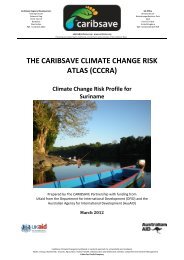Create successful ePaper yourself
Turn your PDF publications into a flip-book with our unique Google optimized e-Paper software.
Short Term Actions<br />
Reassess water pricing structures to ensure that the full cost of water is charged: Water pricing should<br />
include the cost of water supply systems <strong>and</strong> account for required investments. The Department for Water<br />
Undertaking should reassess water pricing structures to ensure that prices are set at a level which<br />
encourages water conservation, reducing water wastage <strong>and</strong> dem<strong>and</strong>.<br />
Medium Term Actions<br />
Develop computer models of groundwater flow to account for the impact of sea-level rise on<br />
groundwater levels: Numerical models of ground-water have been used elsewhere to establish how sealevel<br />
rise impacts on aquifer thickness <strong>and</strong> saline intrusion (e.g. Bobba, 2002). Due to the particular<br />
vulnerability of aquifers in the <strong>Turks</strong> <strong>and</strong> <strong>Caicos</strong> Isl<strong>and</strong>s, these models should be developed in order to<br />
effectively mitigate the effects of climate change on freshwater resources. Whereas the expertise for this<br />
recommendation may not be present within statutory bodies, this initiative may need to be contracted out<br />
by the Department of Water Undertaking to specialised consulting firms or the academic research<br />
fraternity.<br />
Increase water conservation measures, particularly in the tourism industry: In hotels, these measures<br />
should include the installation of low flush toilets, automated faucet controls in public facilities <strong>and</strong> aerated<br />
faucets in guest rooms, <strong>and</strong> low flow showerheads in bathrooms. Water saving technologies in the tourism<br />
sector should be encouraged (Climate Change Committee, 2011), including waste water recycling.<br />
Long Term Actions<br />
Assess the possibility of broad scale implementation of localised waste water recycling schemes <strong>and</strong><br />
legislation, including for agricultural irrigation: Reducing the required fresh water for household <strong>and</strong> hotel<br />
use would alleviate pressure on groundwater systems. The country also engages in a number of activities<br />
that dem<strong>and</strong> considerable quantities of water, for instance golf courses <strong>and</strong> the tourism industry<br />
particularly through cruise ships. Waste water from domestic <strong>and</strong> tourism use can be recycled to produce<br />
irrigation water, either for agriculture or the irrigation of golf courses. Key stakeholders from Government<br />
(the Department for Water Undertaking, Department of Tourism), the private sector (TSG Water, <strong>Turks</strong> <strong>and</strong><br />
<strong>Caicos</strong> Hotel <strong>and</strong> Tourism Association) <strong>and</strong> the local community (<strong>Turks</strong> <strong>and</strong> <strong>Caicos</strong> Farmers <strong>and</strong> Community<br />
Association) can investigate this potential. Such an initiative would alleviate the pressure on groundwater<br />
resources <strong>and</strong> reduce the need for desalination<br />
Water infrastructure should be developed to increase access to sanitation facilities <strong>and</strong> safe water, <strong>and</strong><br />
reduce vulnerability to climate variability <strong>and</strong> extreme events, including droughts <strong>and</strong> major storms or<br />
hurricanes: This will require the collaborative effort of government <strong>and</strong> private sector stakeholders<br />
involved in water resources, health <strong>and</strong> planning to ensure that:<br />
(i) water storage is encouraged through incentives <strong>and</strong> every new building has its own rain water<br />
harvesting <strong>and</strong> stored water infrastructure; encouragement should be given to retrofit these to<br />
existing properties which do not already have them (Byron, 2011);<br />
(ii) the viability of additional large public storage facilities be assessed, allowing improved access to<br />
potable water in different communities;<br />
(iii) losses in water distribution be reduced through pipe replacement, <strong>and</strong> monitored through the<br />
use of electronic bulk metering (Byron, 2011); <strong>and</strong><br />
171





